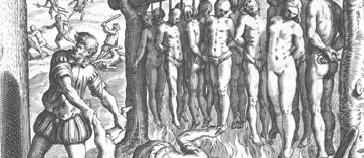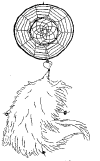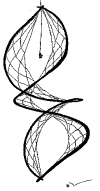The Native
American Holocaust -
Sex, Race and Holy War
-
4
What in fact was happening in those initial years of contact
between the British and America's native peoples was a classic case of
self-fulfilling prophecy, though one with genocidal consequences. Beginning
with a false prejudgment of the Indians as somehow other than conventionally
human in European terms (whether describing them as living "after the manner
of the Golden Age" or as "wild beasts and unreasonable creatures"),
everything the Indians did that marked them as incorrigibly non-European and
non-Christian-and therefore permanently non-civilized n British
eyes-enhanced their definitionally less -than-human status. Treating them
according to this false definition naturally brought on a resentful response
from the Indians-one which only "proved" (albeit spuriously) that the
definition had been valid from the start. In his famous study of this
phenomenon Robert K. Merton-after quoting the sociological dictum that "if
men define situations as real, they are real in their consequences"- pointed
out that "the specious validity of the self-fulfilling prophecy perpetuates
a reign of error." In the early and subsequent years of British-Indian
contact, however, it produced and perpetuated a reign of terror because it
was bound up with an English lust for power, land, and wealth, and because
the specific characteristics that the English found problematic in the
Indians were attributes that fit closely with ancient but persistently held
ideas about the anti-Christian hallmarks of infidels, witches, and wild men.
It was only to be expected, therefore, that when the
witchcraft crisis at Salem broke out as the seventeenth century was ending,
it would be blamed by New England's foremost clergyman on "the Indians,
whose chief Sagamores are well known unto some our Captives, to have been
horrid Sorcerers, and hellish Conjurers, and such as Conversed with
Daemons." Indeed, as Richard Slotkin has shown, the fusion of the satanic
and the native in the minds of the English settlers by this time had become
so self-evident as to require no argument. Thus, when a young woman named
Mercy Short became possessed by the Devil, she described the beast who had
visited her as "a wretch no taller than an ordinary Walking-Staff; he was
not of a Negro, but of a Tawney, or an Indian colour; he wore a high-crowned
Hat, with straight Hair; and had one Cloven-foot." Observes Slotkin: "He
was, in fact, a figure out of the American Puritan nightmare . . .
Indian-colored, dressed in a Christian's hat, with a beast s foot-a kind of
Indian-Puritan, man-animal half-breed.
***
p231
... Probably never before in Christian history had the idea that humankind
was naturally corrupt and debased reached and influenced the daily lives of
a larger proportion of the lay community than during New England's
seventeenth and early eighteenth centuries.
***
... from the earliest days of settlement the British colonists repeatedly
expressed a haunting fear that they would be "contaminated" by the presence
of the Indians, a contamination that must be avoided lest it become the
beginning of a terrifying downward slide toward their own bestial
degeneration. Thus, unlike the Spanish before them, British men in the
colonies from the Carolinas to New England rarely engaged in sexual
relations with the Indians, even during those times when there were few if
any English women available. Legislation was passed that "banished forever"
such mixed race couples, referring to their offspring in animalistic terms
as "abominable mixture and spurious issue," though even without formal
prohibitions such intimate encounters were commonly "reckoned a horrid crime
with us," in the words of one colonial Pennsylvanian." It is little wonder,
then, that Mercy Short described the creature that possessed her as both a
demon and, in Slotkin's words, "a kind of Indian-Puritan, man-animal
half-breed," for this was the ultimate and fated consequence of racial
contamination.
Again, however, such theological, psychological, and
legislative preoccupations did not proceed to the rationalization of
genocide without a social foundation and impetus. And if possessive and
tightly constricted attitude toward sex, an abhorrence of racial
intermixture, and a belief in humankind's innate depravity had for centuries
been hallmarks of Christianity and therefore of the West's definition of
civilization, by the time the British exploration and settlement of America
had begun, the very essence of humanity also was coming to be associated in
European thought with a similarly possessive, exclusive, and constricted
attitude toward property. For it is precisely of this time that R.H. Tawney
was writing when he observed the movement away from the earlier medieval
belief that "private property is a necessary institution, at least in a
fallen world . . . but it is to be tolerated as a concession to human
frailty, not applauded as desirable in itself," to the notion that "the
individual is absolute master of his own, and, within the limits set by
positive law, may exploit it with a single eye to his pecuniary advantage,
unrestrained by any obligation to postpone his own profit to the well-being
of his neighbors, or to give account of his actions to a higher authority."
The concept of private property as a positive good and even
an insignia of civilization took hold among both Catholics and Protestants
during the sixteenth century. Thus, for example, in Spain, Juan Gines de
Sepulveda argued that the absence of private property was one of the
characteristics of people lacking "even vestiges of humanity," and in
Germany at the same time Martin Luther was contending "that the possession
of private property was an essential difference between men and beasts." In
England, meanwhile, Sir Thomas More was proclaiming that land justifiably
could be taken from "any people [who] holdeth a piece of ground void and
vacant to no good or profitable use," an idea that also was being
independently advanced in other countries by Calvin, Melanchthon, and
others. Typically, though, none was as churlish as Luther, who pointed out
that the Catholic St. Francis had urged his followers to get rid of their
property and give it to the poor: "I do not maintain that St. Francis was
simply wicked," wrote Luther, "but his works show that he was a weak-minded
and freakish man, or to say the truth, a fool."
The idea that failure to put property to "good or profitable
use" was grounds for seizing it became especially popular with Protestants,
who thereby advocated confiscating the lands owned by Catholic monks. As
Richard Schlatter explains:
The monks were condemned, not for owning property, but
because they did not use that property in an economically productive
fashion. At best they used it to produce prayers. Luther and the other
Reformation leaders insisted that it should be used, not to relieve men from
the necessity of working, but as a tool for making more goods. The attitude
of the Reformation was practically, "not prayers, but production." And
production, not for consumption, but for more production.
The idea of production for the sake of production, of course,
was one of the central components of what Max Weber was to call the
Protestant Ethic.
***
p237
As early as the first explorations at Roanoke, Thomas Hariot had observed
that whenever the English visited an Indian village, "within a few days
after our departure . . . the people began to die very fast, and many in a
short space: in some towns about twenty, in some forty, in some sixty, and
in one six score, which in truth was very many in respect of their numbers."
As usual, the British were unaffected by these mysterious plagues. In
initial explanation, Hariot could only report that "some astrologers,
knowing of the Eclipse of the Sun, which we saw the same year before on our
voyage thitherward," thought that might have some bearing on the matter. But
such events as solar eclipses and comets (which Hariot also mentions as
possibly having some relevance) were, like the epidemics themselves, the
work of God. No other interpretation was possible. And that was why, before
long, Hariot also was reporting that there seemed to be a divinely drawn
pattern to the diseases: miraculously, he said, they affected only those
Indian communities "where we had any subtle device practiced against us." In
other words, the Lord was selectively punishing only those Indians who
plotted against the English.
Needless to say, the reverse of that logic was equally
satisfying-that is, that only those Indians who went unpunished were not
evil. And if virtually all were punished? The answer was obvious. As William
Bradford was to conclude some years later when epidemics almost totally
destroyed the Indian population of Plymouth Colony, without affecting the
English: "It pleased God to visit these Indians with a great sickness and
such a mortality that of a thousand, above nine and a half hundred of them
died, and many of them did rot above the ground for want of burial." All
followers of the Lord could only give thanks to "the marvelous goodness and
providence of God," Bradford concluded. It was a refrain that soon would be
heard throughout the land. After all, prior to the Europeans' arrival, the
New World had been but "a hideous and desolate wilderness," Bradford said
elsewhere, a land "full of wild beasts and wild men." In killing the Indians
in massive numbers, then, the English were only doing their sacred duty,
working hand in hand with the God who was protecting them.
For nothing else, only divine intervention, could account for
the "prodigious Pestilence" that repeatedly swept the land of nineteen out
of every twenty Indian inhabitants, wrote Cotton Mather, "so that the Woods
were almost cleared of these pernicious Creatures, to make room for a better
Growth." Often this teamwork of God and man seemed to be perfection itself,
as in King Philip's War. Mather recalled that in one battle of that war the
English attacked the native people with such ferocity that "their city was
laid in ashes. Above twenty of their chief captains were killed; a
proportionable desolation cut off the interior salvages; mortal sickness,
and horrid famine pursued the remainders of 'em, so we can hardly tell where
any of 'em are left alive upon the face of the earth."
Thus the militant agencies of God and his chosen people
became as one. Mather believed, with many others, that at some time in the
distant past the "miserable salvages" known as Indians had been "decoyed" by
the Devil to live in isolation in America "in hopes that the gospel of the
Lord Jesus Christ would never come here to destroy or disturb his absolute
empire over them."' But God had located the evil brutes and sent his holiest
Christian warriors over from England where-with the help of some divinely
sprinkled plagues - they joyously had "Irradiated an Indian wilderness." It
truly was, as another New England saint entitled his own history of the holy
settlement, a "wonder-working providence."
***
Again and again the explanatory circle closed upon itself. Although they
carried with them the same thousand years and more of repressed, intolerant,
and violent history that earlier had guided the conquistadors, in their
explorations and settlements the English both left behind and confronted
before them very different material worlds than had the Spanish. For those
who were their victims it didn't matter very much. In addition to being
un-Christian, the Indians were uncivilized and perhaps not even fully human.
The English had been told that by the Spanish, but there were many other
proofs of it; one was the simple fact (untrue, but that was immaterial) that
the natives "roamed" the woods like wild beasts, with no understanding of
private property holdings or the need to make "improvements" on the land. In
their generosity the Christian English would bring to these benighted
creatures the word of Christ and guidance out of the dark forest of their
barbarism. For these great gifts the English only demanded in return-it was,
after all, their God-given right-whatever land they felt they needed, to
bound and fence at will, and quick capitulation to their religious ways.
Sex, Race and Holy War
1 -
2 -
3 -
4
- 5










 Get
software to streamline your business and run it hands free.
Get
software to streamline your business and run it hands free.
